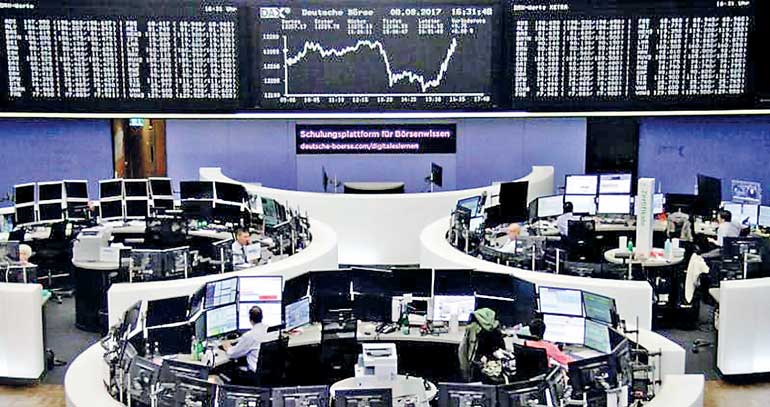Wednesday Feb 25, 2026
Wednesday Feb 25, 2026
Thursday, 10 August 2017 00:01 - - {{hitsCtrl.values.hits}}
 London (Reuters): President Donald Trump’s warning North Korea faced “fire and fury” and Pyongyang’s threat of possible retaliation drove investors out of stocks on Wednesday and into the safety of the yen, Swiss franc, gold and government debt.
London (Reuters): President Donald Trump’s warning North Korea faced “fire and fury” and Pyongyang’s threat of possible retaliation drove investors out of stocks on Wednesday and into the safety of the yen, Swiss franc, gold and government debt.
European shares slid, following falls in Asia and on Wall Street. US stock index futures also fell, with the S&P 500 indicated to open down 0.5%.
The Swiss franc, by contrast, was on track for its biggest single-day rise in more than 2 1/2 years.
“Trump’s comments about North Korea have created nervousness and the fear is if the President really means what he said: “fire and fury”,” said Naeem Aslam, chief market analyst at Think Markets in London.
“The typical text book trade is that investors rush for safe havens.”
Trump’s remarks on Tuesday that North Korea would face “fire and fury like the world has never seen” pushed Wall Street lower on Tuesday and drove up the VIX “fear gauge” of expected volatility on the S&P 500 higher.
The VIX rose further on Wednesday, rising as far as 12.11, its highest in almost a month.
A spokesman for the Korean People’s Army said in a statement it was “carefully examining” plans for a missile attack on the US Pacific territory of Guam, which has a large US military base.
In Europe, the pan-continental STOXX 600 index lost 0.9%, with falls deepening after reports a car had rammed a group of soldiers in Paris, injuring six.
France’s CAC dropped 1.8% and Germany’s DAX fell 1.5%.
Tokyo’s Nikkei 225 share index closed down 1.3% at its lowest since 1 June as the strong yen hit exporters, while South Korea’s KOSPI index fell 1.1% to seven-week lows.
South Korea’s won currency dropped 0.9% against the dollar to its lowest close since 13 July.
MSCI’s main index of Asia-Pacific shares, excluding Japan, was last down 0.6%. Chinese blue chips closed flat but Hong Kong’s Hang Seng fell 0.4%.
Instead, investors turned to the traditional safe-haven assets sought in troubled times, the Japanese yen strengthened 0.5% to 109.73 to the dollar.
The Swiss franc reversed a two-week losing streak and gained 1.1% to 0.9611 per dollar. The Swiss currency was also on track for its biggest daily gain against the euro since the Swiss National Bank removed its cap on the currency in January 2015.
“Heightened geopolitical risks overnight have seen the markets flip from risk-on to risk-off and we have to wait and see how long this move runs before adding some positions,” said Viraj Patel, an FX strategist at ING in London.
The dollar index, which measures the US currency against a basket of major peers, slipped 0.1% as US Treasury yields fell.
The euro dipped 0.1% to $1.1737 but the single European currency has been slipping this week against the dollar, having hit a more than 2 1/2-year high of $1.1892 on 2 August.
Yields on core government debt fell. Ten-year US yields dropped 4 basis points to 2.242% and German equivalents fell 3 bps to 0.43%, a six-week low.
Gold rose 0.6% to $1,268 an ounce.
“We’ve had some competing forces play out over the past 12 hours - the US dollar was stronger off economic data, but that was quickly reversed with President Trump’s comments about North Korea earlier today (Wednesday),” said ANZ analyst Daniel Hynes.
Oil prices rose before a report expected to show US crude stocks fell for a sixth week. Bent crude, the global benchmark, rose 19 cents to $ 52.33 a barrel.